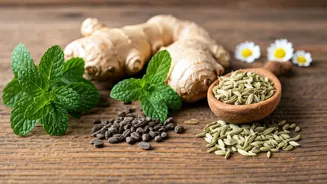Understanding Bloating
Bloating, frequently described as a feeling of fullness and abdominal distension, can arise from various factors. It often results from the buildup of gas
in the gastrointestinal tract, which can be caused by swallowing air, bacterial fermentation of undigested food, or issues with the digestive process. Certain foods, like those high in fiber, or containing complex carbohydrates that are difficult to break down, can contribute to gas production. Additionally, underlying medical conditions, such as irritable bowel syndrome (IBS) or celiac disease, can lead to bloating. It's important to distinguish bloating from other abdominal issues like water retention or weight gain, as this distinction influences the most effective solutions. Recognizing the root causes is the initial step in managing and reducing bloating, helping individuals find strategies that suit their specific circumstances.
Dietary Adjustments
Making dietary modifications can be a highly effective strategy to tackle bloating. One of the initial steps involves identifying and reducing the intake of foods known to trigger gas production. Foods like beans, lentils, broccoli, cabbage, onions, and carbonated beverages are frequently culprits. Keeping a food diary can help in pinpointing specific dietary triggers. Additionally, gradually incorporating more fiber into your diet is crucial, though it is important to do so gradually, as a sudden surge in fiber intake can initially exacerbate bloating. Eating slowly and avoiding large meals can also improve digestion and lessen bloating. Paying attention to how you eat, such as by avoiding talking while eating, can reduce the swallowing of air, which can contribute to bloating. Furthermore, staying sufficiently hydrated supports the digestive process and may lessen bloating, highlighting that a balanced dietary approach can be a powerful tool for relief.
Herbal Remedies
Herbal remedies can play a significant role in alleviating bloating symptoms. Several herbs have traditionally been used to support digestive health and lessen gas production. Peppermint, for example, is known for its antispasmodic properties, which can ease abdominal discomfort. Ginger has anti-inflammatory effects that can aid in digestion and reduce bloating. Chamomile tea can help soothe the digestive tract and lessen discomfort. Certain herbal supplements, like fennel seeds, also show promise in decreasing bloating. When incorporating herbal remedies, it's advisable to start with moderate dosages and note how your body responds. While herbal remedies are frequently well-tolerated, they can interact with medications. It is always recommended to consult with a healthcare professional before starting any new herbal supplements, to ensure they are suitable for your overall health and do not interfere with any current medical treatments.
Lifestyle Changes
Integrating lifestyle adjustments can contribute to long-term relief from bloating. Regular physical activity is crucial; it helps in promoting proper digestion and the movement of gas through the digestive tract. Incorporating light exercises such as walking, yoga, or gentle stretches into your daily routine can offer relief from bloating. Managing stress is also significant, as stress can negatively affect the digestive system. Implementing stress-reduction techniques like deep breathing exercises or meditation can reduce the impact of stress on bloating. In addition, being mindful of your posture and avoiding tight-fitting clothing can also help in alleviating abdominal discomfort. Furthermore, making sure you are drinking enough water to promote digestion and bowel regularity is also an important change to incorporate into your lifestyle. These lifestyle modifications will contribute to enhancing your overall well-being and reducing the instances of bloating.
Medical Interventions
In some instances, medical interventions might be necessary to address persistent or severe bloating. Consulting a healthcare professional is essential if bloating is accompanied by other symptoms, such as severe abdominal pain, unexplained weight loss, or changes in bowel habits, as these might indicate an underlying medical condition. The medical professional might recommend diagnostic tests to evaluate the root cause of the bloating, which might include blood tests or imaging studies. Depending on the diagnosis, the doctor might prescribe medications to help manage the symptoms. In cases where bloating is related to specific digestive disorders, medications to support digestion or alter gut flora may be recommended. Additionally, individuals should follow any dietary or lifestyle advice given by their healthcare provider. Considering medical advice and treatments when necessary ensures a holistic approach to dealing with bloating and addresses any underlying medical concerns.


















